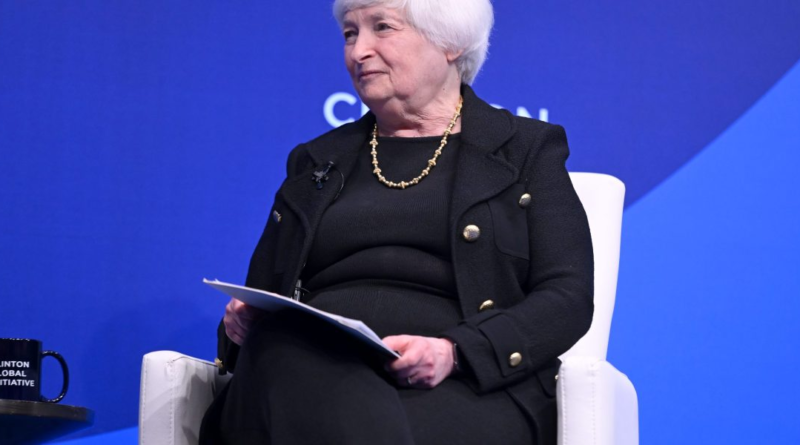Janet Yellen says AI's 'unbelievably rapid' development could 'make a significant difference' in boosting the economy—but she wants to be careful
As Treasury Secretary Janet Yellen balances the needs of a fragile economy, she is cautiously optimistic that the explosion of AI could supercharge productivity—a key metric that has plunged over the last year.
Speaking at the Fortune CEO Initiative conference on Tuesday, Yellen said that she is no expert on the technology, but still understands its potential impact. “The progress in this area is unbelievably rapid, and it could make a significant difference” in boosting the economy’s productivity, she said.
Yellen emphasized that any gains from AI would come amid a rise in U.S. investment in other areas, spurred by three major spending bills backed by the Biden administration over the past two years: 2021’s infrastructure bill and the CHIPS and Science Act and Inflation Reduction Act, both from 2022. She described the legislation as a “trifecta” that is investing in research and development on a scale not seen in decades.
“We’re restoring U.S. leadership in science and tech,” she said.
Soft landing
Yellen has been at the center of U.S. monetary policy for decades, including serving as the chair of the Federal Reserve for four years from 2014 to 2018 before assuming her current role under President Joe Biden in early 2021.
Her past two years in office have seen the administration navigate a rocky economic landscape, with the government seeking an elusive “soft landing” to historic inflation spurred by the pandemic and Russia’s invasion of Ukraine. With inflation reclining and experts reducing their predictions for a recession, Yellen expressed optimism for the U.S. economic outlook and touched on that elusive holy grail of a buoyant economy.
“Short-term inflation is coming down in the context of an extremely strong labor market, which people would normally call a soft landing,” she said, speaking at the event in Washington, D.C.
As Republicans push for reduced spending—including nearly plunging the government into a shutdown last weekend—Yellen said she feels confident in the administration’s path.
While she acknowledged that the government must establish spending and revenue targets that put the country on a sustainable fiscal path, Yellen argued that one key metric points to responsible behavior: how much of the country’s GDP is going to service the debt. Yellen said that the figure for the U.S. is currently at 1%, which she described as “completely normal” by historical standards, caveating that the number is predicated on meaningful deficit reduction over the next decade.
Despite the government’s seeming avoidance of a recession, Yellen was still hesitant to predict whether interest rates would remain high to combat persistent inflation, noting that she no longer occupies her perch at the U.S. central bank.
She pointed to structural forces that could push interest rates down such as an aging population, globally weak investment opportunities, and a propensity to save among the general population, arguing that they are “alive and well.”
Even so, Yellen said that other factors could push up real interest rates, such as investment opportunities with climate change.
China decoupling
Yellen did highlight one economic area where the U.S. should proceed with caution: Its relationship with China.
While she said that she is generally not a proponent of industrial policy, she cautioned that the U.S. has become overly reliant on China for sectors like clean energy, which she said that the country has “enormously subsidized.”
“I don’t believe we should decouple at all from China, but I do think we need to derisk,” Yellen said.
She lauded recent efforts by the U.S. to invest in areas with national security implications, including semiconductors, and said that the sectors should continue to be an emphasis for the government. The Biden administration seems to be forming a moat around the critical industry in the U.S., with Reuters reporting on Monday that the administration warned China that it plans to update its rules on curbing shipments of A.I. chips and chipmaking tools.
“We’re fooling ourselves if we think that abandoning … semiconductor manufacturing is a smart area for the United States,” she said.


